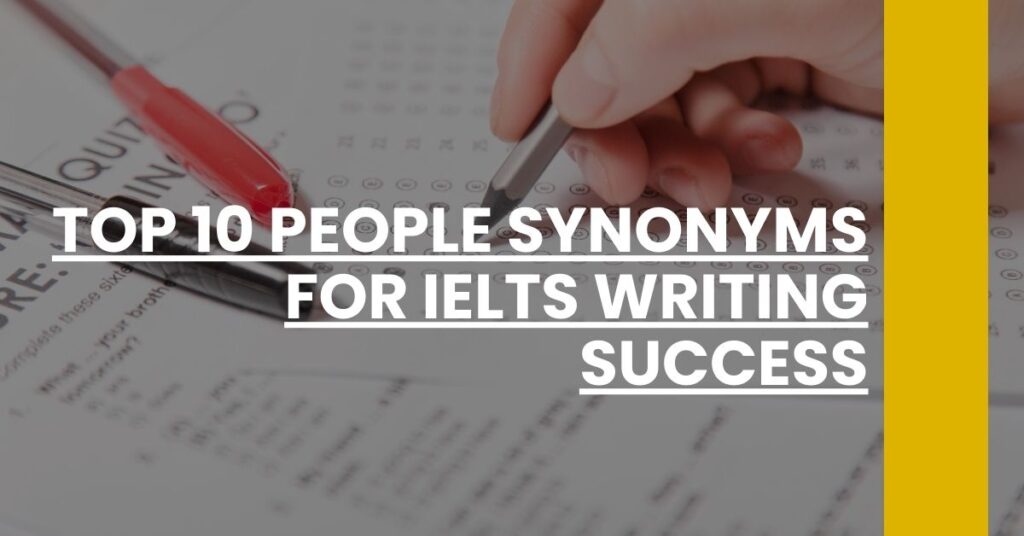Are you an IELTS candidate looking to leave a lasting impression with your writing?
Crafting the perfect essay means moving beyond the basics—starting with your vocabulary.
In this article, we reveal key people synonyms for IELTS—words that resonate with the sophisticated English of high scorers.
Enhance your essays and speak the language of success!
- 1. Individuals: Showcasing Variety in Writing
- 2. Inhabitants: Contextual Synonym for Regions
- 3. Citizens: When to Use Civic Terminology
- 4. Residents: A Term for Locality
- 5. The Populace: A Synonym for the Masses
- 6. The Public: Including Everyone
- 7. Society: The Collective Human Aspect
- 8. Community: A Closer Look at Group Dynamics
- 9. The Workforce: Addressing the Economic Sector
- 10. The Population: Quantifying People
- Enhancing Vocabulary for IELTS
- Synonyms in Context
- Conclusion: Elevating Your IELTS Writing
1. Individuals: Showcasing Variety in Writing
When you’re undertaking the IELTS writing tasks, it’s crucial to demonstrate a sophisticated command of the English language. The word “people” is often overused, and switching it up with “individuals” can significantly upgrade your writing style. Let’s dive into why:
- Precision and Formality: “Individuals” exudes a formal tone, perfect for academic essays where specificity is key. Each person is unique, and “individuals” highlights this diversity, which can add depth to your argument and impress the IELTS examiners.
- Academic Flair: Essays, reports, and letters in the IELTS test that demand an impersonal and academic approach can benefit from the term “individuals”. It signals to the examiner that you are comfortable with complex language and concepts.
By incorporating “individuals” into your writing, you’re signaling that you’re not just repeating rote memorized phrases but employing a rich vocabulary that reflects a nuanced understanding of the topic at hand.
2. Inhabitants: Contextual Synonym for Regions
Imagine you’re describing the richness of cultural diversity in a specific location during your IELTS writing task. Simply using “people” might not capture the geographical bind; however, “inhabitants” does that effortlessly. This term quite literally places individuals within the context of their surroundings:
- Geographical Tie: The strength of “inhabitants” lies in its ability to visually locate individuals within their environment, providing a sense of place and community.
- Cultural Reflection: Discussing “inhabitants” can reflect the cultural, social, and even historical connotations of a region, which enriches your essay by showing a deep understanding of the locale.
Craft essays with this term to give dimension to your descriptions and analysis, ensuring they are grounded in real-world settings and communities, thus making your writing all the more compelling.
3. Citizens: When to Use Civic Terminology
In certain IELTS essays, especially those tackling civic issues, the word “citizens” can serve as a precise tool to focus on the rights and responsibilities that bind a population. Here’s how you can smartly incorporate this term into your content:
- Civic Engagement: Refer to “citizens” when discussing laws, government policies, or national identity. This emphasizes legal and ethical obligations that are central to the concept of citizenship.
- National Scope: The use of “citizens” narrows the focus to a specific country’s populace, which is especially valuable when your essay addresses issues like voting, nationalism, or public services.
By carefully selecting “citizens”, you exhibit an awareness of political and social constructs, showcasing a maturity in your thinking that distinguishes citizens from residents and, in turn, your essay’s focus.
4. Residents: A Term for Locality
Discussing community initiatives or local governance? “Residents” is the term you’re looking for. This synonym for “people” brings a sense of belonging and community focus to your writing:
- Local Lens: “Residents” hones in on a specific area—a city, neighborhood, or building—giving your writing a clear context.
- Community Issues: Use this term when exploring topics that impact a specific group of people within a well-defined area, such as urban development, communal resources, or local elections.
Incorporate “residents” when your IELTS essay demands a localized perspective, suggesting a rich, textured understanding of the smaller, yet significant, landscapes that make up our world.
5. The Populace: A Synonym for the Masses
Want to discuss broader social currents or public opinion? “The populace” is a powerful synonym that encompasses the general body of people within a particular country or area. Here’s why it works well:
- Societal Trends: When tapping into collective thought or action, “the populace” helps to express the impact or opinion of the majority.
- Democratic Elements: This term is particularly effective when your writing touches on democratic processes or collective decision-making.
Swap in “the populace” to give your writing a sense the writing embodies the essence of the broad public when tackling large-scale societal issues.
6. The Public: Including Everyone
“The public” is an all-encompassing term that mirrors “people” but with wider social implications. Its use is ideal for writing that speaks to shared experiences or general societal consensus:
- Universal Appeal: “The public” is most suited to contexts where inclusivity and the collective experience is at the forefront.
- Government and Policy: This is a go-to term for discussing topics like public services, government accountability, or general societal norms, as it signifies the communal aspect of these areas.
Employ “the public” in scenarios where you want to emphasize the societal angle, creating a narrative that resonates on a communal level and speaks to the collective journey.
7. Society: The Collective Human Aspect
When your IELTS essay veers into discussions about cultural norms or overarching social behaviors, reaching for the word “society” can significantly strengthen your argument. Here’s how to deftly use this term:
- Broader Contexts: “Society” has a grandiose feel to it, elevating your writing when discussing large-scale issues that affect the general way of life.
- Human Collective: Unlike the more individual-oriented “people,” “society” captures the collective entity shaped by shared values, traditions, and social conventions.
An intelligent use of “society” demonstrates your ability to grasp complex social constructs and articulate them with precision—a skill that’s quite valuable for achieving a high band score in the IELTS writing modules.
8. Community: A Closer Look at Group Dynamics
Drill down into more intimate group interactions with the term “community.” This synonym is your toolkit for interpersonal relations, shared goals, or mutual support mechanisms. Here’s when you might want to use “community” in your IELTS essay:
- Shared Characteristics: Use “community” when pointing out the commonalities that bond a group of people—be it ethnicity, location, or interest.
- Support Structures: Highlight how people come together to support one another in times of need or to achieve a common goal with “community.”
Utilizing “community” effectively suggests you appreciate the finer nuances of group solidarity and dynamics, enhancing the richness of your writing.
9. The Workforce: Addressing the Economic Sector
For essays that touch upon economics, employment, or productivity, “the workforce” is an essential term to include. Here’s how you can weave it into your content:
- Labor Market Discussions: “The workforce” refers specifically to the segment of society employed or available for work.
- Economic Implications: This term is crucial when examining how economic policies affect the lives of the employed populace or the importance of labor rights.
Skilled incorporation of “the workforce” into your IELTS writing signals a keen sense of economic factors, which can boost your score for task response and coherence.
10. The Population: Quantifying People
When your essay features a discussion about demographics, don’t just refer to “people.” Use “the population” to spice up your language arsenal. These are the instances where using “the population” can give your writing an edge:
- Demographic Data: This term comes in handy when referencing statistical data about groups of people within a specific area.
- Health and Development: Use “the population” when delving into public health, education levels, or other services provided on a national or global scale.
Accurate use of “the population” suggests that you’re capable of discussing complex demographic trends with ease, a competency that could boost your IELTS writing score.
Enhancing Vocabulary for IELTS
Expanding your IELTS vocabulary is about more than memorizing lists of words. Let’s explore how to grow your lexical resource sustainably:
- Read Wisely: Diverse reading habits can expose you to new words and contexts. The richer the material, the richer your vocabulary.
- Learn Collocations: Understanding common word pairings enhances your natural writing fluency.
- Synonyms and Nuances: Grasp subtle differences between words to avoid misuse in varying contexts.
The goal is to develop a robust vocabulary that feels natural and can be flexibly applied to different essay topics.
Synonyms in Context
Using synonyms effectively in your IELTS writing is an art. It’s not just about word substitution; it’s about maintaining the context and preserving the original meaning. Here are methods to achieve this:
- Understand Nuances: Acknowledge the subtle differences in meaning among synonyms to ensure appropriateness.
- Maintain Cohesiveness: Use synonyms that fit seamlessly into your sentence structure, maintaining the flow of ideas.
- Contextual Relevance: Select synonyms based on the particular context of your argument or narrative.
Incorporating synonyms thoughtfully can showcase your language proficiency while keeping the integrity of your message intact.
Conclusion: Elevating Your IELTS Writing
Delivering an IELTS writing task that impresses comes down to your mastery of language. Sprinkling your prose with well-selected “people synonyms for IELTS” isn’t mere decoration—it’s a demonstration of your ability to command English with versatility and precision.
Remember, each word choice is a reflection of your understanding and articulation. These synonyms empower you to convey meaning in a richer, more precise manner, setting the foundation for a high-scoring IELTS essay.
So, choose your words wisely, embed them naturally, and write with the confidence that your lexical choices will lead you to success.
Master IELTS with people synonyms: Elevate your essays using varied language to impress examiners and score higher on your test.

